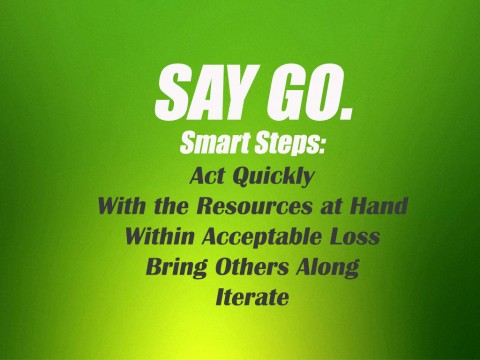Say Go
May 20, 2014 7 CommentsI’ve been thinking a lot about process. What is the best way to get things done? What is the most collaborative and inclusive way to move forward? Our bias towards inclusion, towards a process that is truly democratic, can often seem at odds with the idea that “action trumps everything.”
Curtis was recently looking at the distinction between do-acracy and democracy. He was writing about ways to balance the best of nimble do-acracy with collective deliberation and governance. And he emphasized the importance of being clear about when, where, and with whom it is important to have collective conversation, alignment and agreement.
Given that we learn by doing, and that iteration is better than planning – how do we nurture the force of forward motion while honoring the need for deliberation?
I’m not sure. We are continually experimenting.
What I do know is that Seth Godin’s Blog post, “Who Says Go,” really resonated with me. My experience is that deliberation and inclusion can often turn into places to hide. These most important of values can also serve as the excuses that keep us from choosing.
Seth points out how rare it is to find that person who says “go.” In my leadership trainings, I always tell participants that the best way to become a leader is to learn to decide, to dare to make choices. This is the big value add and I think that it holds true even in a context that demands greater inclusion.
A smart-step is defined this way:
- Act Quickly
- With the Resources at Hand
- Within Acceptable Loss
- Bring Others Along
- Iterate
So dare to say go. Learn to decide, and decide often.
But make your next step small and smart.
And always bring others along.

7 Comments
Thanks, Gibran. I have also seen that “deliberation and inclusion can often turn into places to hide,” particularly for groups with a relatively high amount of class or race privilege that are trying to figure out how to engage in responsible social justice work.
I’m not sure which I like better, Gibran’s post or Jen’s comment. Both right on target.
Thx Charlie
Yes! And… how do we also make sure that the “just do it” ethic doesn’t privilege those who have the resources to get going the fastest?
I appreciate the sensibility Cynthia, and I hope the post captured my concern. But I’m also intentionally poking at the deeply held assumption that it takes the oppressed longer to move.
The 2nd part of a “smart step” is “with the resources at hand” – whatever those might be. We gain momentum by moving, regardless of how poor we are.
Not at all suggesting that poor people move more slowly. Only that people with more resources tend to move quickly without consulting or involving folks who are affected.
I think that’s where the “bring others along” part of a smart step comes into play, specially with a stakeholder analysis that is biased towards the excluded.